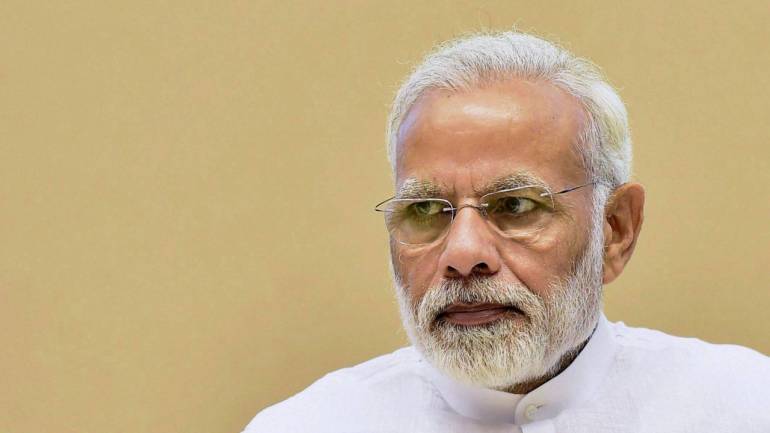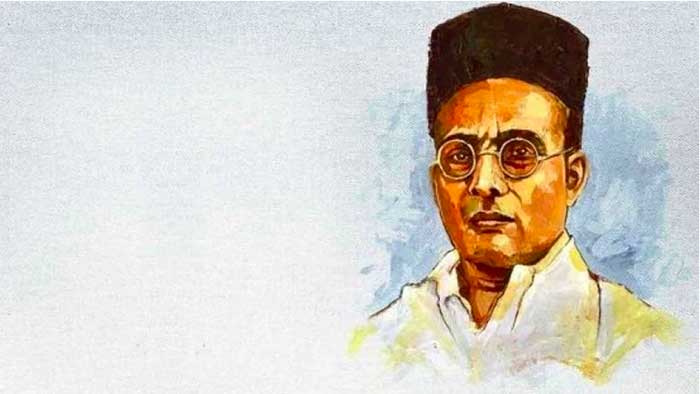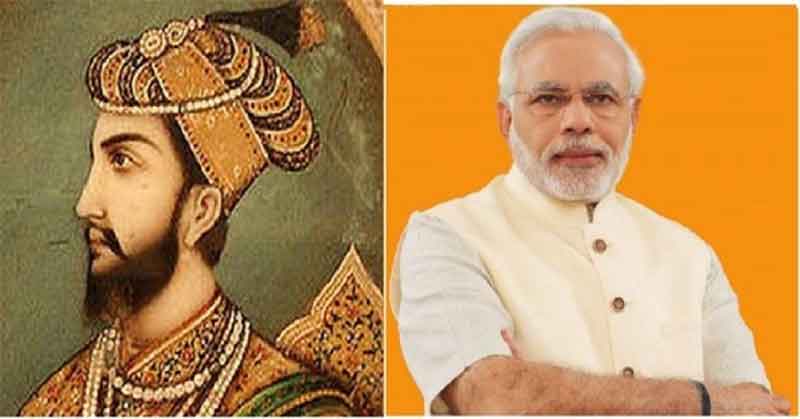
“He (Narendra Modi) gifted ittar (perfume derived from natural sources) bottles in zardozi box, crafted in Lucknow, to French President Emmanuel Macron.” (The Times of India, June 29, 2022)
“Here is the smell of the blood still: all the perfumes of Arabia will not sweeten this little hand.” (Shakespeare: Macbeth).
The above two quotes sum up the record of Modi’s olfactory hypocritical politics – serving sweet smelling perfumes abroad, while spreading inside India the `smell of the blood’ of Muslims, Dalits, and victims of bulldozer demolition. Paraphrasing Shakespeare, we can say – `all the perfumes of Lucknow will not sweeten’ his hands which are still stained with the blood of those who were killed during the anti-Muslim genocide in Gujarat in 2002, under his rule as the chief minister.
Modi’s latest performance at the G-7 summit in Germany is yet another example of his double-faced politics. Along with other leaders of the G-7, he signed a statement on `Resilient Democracies,’ committing to free and fair elections, protecting freedom of expression, and gender empowerment. At around the same time, his police in India was hounding proponents of freedom of expression like Teesta Seetalvad and Muhammad Zubeiri.
His efforts at international platforms to make himself smell nice among foreign dignitaries stands out in sharp contrast with his foul-smelling record at home. The stink from within India overpowers the aroma that he wants to spread abroad, as was evident recently when insulting utterances against Prophet Muhammad by official spokespersons of the ruling BJP led to an outburst of anger among West Asian Islamic states against the Indian government.
This was only waiting to happen. For the last several years under Narendra Modi’s rule, the followers of the Prophet in India have not only suffered verbal offence directed against their religion, but also physical violence from goons of the Sangh Parivar, to which Modi belongs. The rulers of the West Asian Islamic states till now chose to turn a blind eye to these atrocities perpetrated upon their co-religionists in India – preferring profitable trade relations to religious obligations. But when their sacrosanct Prophet was attacked, they could not afford to remain silent, as otherwise they would have lost their foothold among their own predominantly Muslim subjects.
But this latest instance of protest by the Islamist states against misbehaviour of leaders of Modi’s ruling party, is only one among the many instances of world-wide disapproval of his performance on other counts, that had been voiced during the last several years by the UN Human Rights Commission, US and European Union countries, international bodies, and reputed academics.
Despite all the ballyhoo over trade relations with these countries, and his attempts at snuggling up to the US and the European Union countries, Narendra Modi is being repeatedly snubbed by them. He may soon find himself being treated as a pariah in global politics – as he was some two decades ago, when he was barred entry into the US, following the genocide of Muslims in 2002 in Gujarat, over which he presided as a chief minister.
India gains world-wide notoriety as a state of garbage, stinking of human rights violation
If we examine the record of the Modi government as assessed by the UN and other global institutions according to universally laid down standards, we find that its performance has sunk to the lowest level. The investigative representatives from these international bodies must have held their noses, repulsed by the malodorous daily reports of deaths from hunger, suicides by farmers, killings of Muslims, Dalits and other minorities, and suppression of civil liberties and democratic rights, under the Modi regime. The Indian Prime Minister has dumped on his people a huge smelly garbage flowing from ill-conceived measures like demonetization, taxation under GST, discrimination against citizens under CAA – and the latest being the much bally-hooed Agnipath (path of fire) and Agniveer (fiery warriors) policy to recruit youngsters on a temporary basis in the army. In an ironical twist, this has boomeranged on Modi, with young aspirants for army jobs resorting to the same fire power Agni. Frustrated by the obstacles put in their path by these new methods of recruitment, they have gone on a spree of arson – setting on fire train coaches, government vehicles, houses of ruling politicians, among other symbols of the establishment.
The awful stink emanating from these policies of the Modi government has now risen high enough to nauseate Rapporteurs of the UN, internationally recognized institutions supervising human rights violation, and reputed academics all over the world.
To start with, according to the UN Human Development Index, India has fallen in terms of average income, education and health. On the Global Hunger Index, which measures hunger, stunting in children and undernourishment, India’s record has declined to such a state that it is behind Pakistan, Nepal and Bangladesh ! As for treatment of women, India has fallen 26 places, according to the Global Gender Gap index issued by the World Economic Forum (popularly known as Davos, which is regularly attended by the Modi government’s representatives).
Human rights under the Modi regime
The other reprehensible record of the Modi government is that of suppression of human rights and persecution of religious minorities. This has invited censure not only from the UN Human Rights Commission, and international bodies and academic institutions, but also from the USCIRF (United States Commission on International Religious Freedom), an official body representing the USA – a state on which Modi is dependent in crucial areas of economy and geo-politics.
In June this year, the US Secretary of State, Antony Blinken released the annual report of USCIRF. Describing the situation in India, the report referred to cases of attacks on members of minority communities, killings, assaults and intimidations that took place there throughout 2021. In response to such allegations, our External Affairs Ministry behaves like a porcupine. Whenever it faces them, in petulant anger it bears its ugly thorns in official statements, like dismissing the US-based Freedom House’s World Index assessment that India has declined from `free’ to `partly free,’ and its ranking Kashmir as `not free.’ But large sections of the Indian population within Kashmir, as well as outside indeed know from their hard experiences that they are `not free.’
One such section largely comprises of victims of the recent bull-dozer drives in Delhi, Allahabad (now renamed Prayagraj) and other Indian cities, who are mainly Muslims. Their plight has drawn attention from UN. The UN-appointed three Special Rapporteurs for Housing, Minority Issues and Freedom of Religion, in a letter to the government of India, dated June 9, 2022, has protested against the incidents of bulldozing of the houses of the poor.
Plight of journalists and social activists under the Modi regime
The Modi government is not only suppressing these demonstrations of protest, but also stifling the voices of journalists who dare to bring these public demonstrations to public notice. Taking note of cases of killing and imprisonment and harassment of journalists by both state and extra-state agencies in India, the international forum of journalists, Reporters Sans Frontiers, in its latest report published in May, 2022 has described India under Modi in the most damning terms: “With an average of three or four journalists killed in connection with their work every year, India is one of the world’s most dangerous countries for the media.” Basing on both quantitative and qualitative surveys, the report states that India has fallen in the ranking of states which violate press freedom. The latest instance of such violation by the Indian state is the arrest of Mohammed Zubair, a co-founder of the news agency Alt News, which had been dismantling fake news (spread by the Hindutva groups) and exposing hate speeches (by the BJP leaders) – whose revelations pose a challenge to the ruling BJP government.
The other target of the Modi government is the community of lawyers and social activists who defend victims of human rights violation by the state and its police. The latest instance is the arrest of Teesta Setalvad, who for the last twenty years, since the massacre of Muslims in the then Narendra Modi-ruled Gujarat in 2002, had been pursuing a case to bring justice to Zakia Jafri, widow of the Congress leader Ehsan Jafri who was killed by a Hindu mob during that time.
Behind Teesta Setalvad’s arrest, we smell a rat crawling up the steps of the Supreme Court. Her arrest followed a bizarre order issued by a Supreme Court bench on June 24, which turned the complainant into an accused. The three member bench, while dismissing Zakia Jafri’s plea seeking punishment of her husband’s killers during the 2002 Gujarta massacre, accused the complainants of “ulterior designs,” and demanded that they “need to be in the dock.” Acting on the cue given by the judges, the police immediately arrested Teesta Setalvad. This ugly acquiescence of the Indian judiciary with an intolerant administration has drawn indictment from Amnesty International. In a statement released on June 25, it condemned Teesta Setalvad’s arrest “by the Indian authorities” as “a direct reprisal against those who dare to question their human rights record.” More importantly, the UN Special Rapporteur on Human Rights Defenders has demanded Teesta Setalvad’s release saying: “Teesta is a strong voice against hatred and discrimination. Defending human rights is not a crime.”
Similarly, when the Alt News co-founder Mohammad Zubair ( known for his courageous endeavours to challenge misinformation by dismantling fake news) was arrested sometime ago, journalist organizations both in India (Editors’ Guild, Press Club of India among others) and abroad came out with statements protesting against the unjustifiable arrest.
Deficiencies in the olfactory ducts and hearing abilities of the Modi government.
As we noted earlier, despite the stink raised by its rash decisions (like demonetization, GST, imposition of lockdown, etc.), the Modi government failed to smell that those decisions would have disastrous effects.
But then, is our Prime Minister willing to hear these voices which castigate him from both within India and abroad ? Or can he smell the stink that has arisen from his policies ? The government that he leads seems to be suffering from both hearing deficiency and loss of smell.
The paradox of the Modi rule
As one examines the above indictments by the UN and other international institutions, one wonders why and how, despite being damned, Narendra Modi in his foreign relations, continues to enjoy support from a vast array of world powers (the two exceptions being China and Pakistan). Despite occasional nudging by UN officials and US diplomats, who ask him to be a bit careful about violation of human rights, and advise him to stop his henchmen from lynching Muslims, Narendra Modi does not care two hoots for such gentle reminders. He can get away with the worst cases of suppression of civil liberties in the domestic sphere, as long as he in his foreign relations, assures the US and the European Union that his government is both a lucrative trading partner for them, and a counter to China’s Increasingly aggressive presence in South Asia which challenges these Western nations. His recent invitation to the G-7 summit is an indication of the way the Western nations are trying to co-opt him in their game plan.
Even in the domestic sphere, Modi enjoys popularity (if one goes by electoral results), despite disastrous measures like demonetization, a repressive lock-down following the Covid outbreak, and the latest Agnipath policy of recruiting jawans, which have wrought havoc on the people. What is the charm that he yields over the Indian masses ? The modern technology of social media which reaches even the remotest village, has been Modi’s best handmaiden. When the people are being pissed upon by his government, they are being told by the media that it is rose water ! The overwhelming perfume of Modi-mani spread by the media numbs their olfactory ducts – the ability to smell and make out stench. Insensitive to the stink raised by the Modi government, they are attracted by what they are made to smell as aroma.
Sumanta Banerjee is a political commentator and writer, is the author of In The Wake of Naxalbari’ (1980 and 2008); The Parlour and the Streets: Elite and Popular Culture in Nineteenth Century Calcutta (1989) and ‘Memoirs of Roads: Calcutta from Colonial Urbanization to Global Modernization.’ (2016).















































